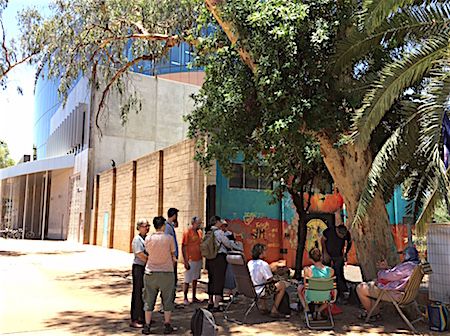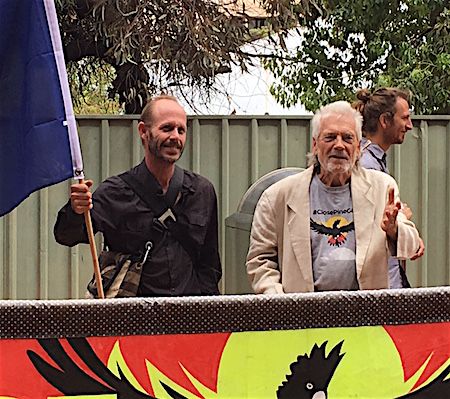Peace Pilgrim says he had permission to be on Pine Gap
14 November 2017
 By KIERAN FINNANE
By KIERAN FINNANE
Peace Pilgrim Paul Christie, on trial in the Supreme Court, told police he had the “permission, blessing and support” of Arrernte elders to be on their land when he was arrested inside the outer perimeter of the Pine Gap military base in the early morning of 3 October last year.
Left: Peace Pilgrims take their lunch break on church land behind the Supreme Court whose lofty edifice can be seen behind them.
He said he was there to pray and sing for their children and children all over the world.
He had no memory of passing fences, signs or other structures during his long walk that night. The path he took “opened up” before him, the light took away “all obstacles”.
He referred to the area where he was found as “stolen land”, adding that there is “no particular area that is not stolen”.
He described the Pine Gap facility as “illegal”, as carrying out “murderous activity”, and as “one of the biggest war criminal hotspots in Australia”.
He had hitchhiked from Alice Springs to a point along Larapinta Drive, then walked following a creek bed. It was the creek that “spoke” to him, telling him to “go this way”. He had “no idea” who picked him up: they were “like angels” and they dropped him off without a question.
These propositions were part of his police Record of Interview (ROI), conducted by Federal Agent Peter Davey, which was played to the court this morning.
Agent Davey asked him to list what equipment he was carrying.
It included, from his memory, a pocketknife (to cut a bandage, if necessary), a Tibetan singing bowl to “pay respects to the element of the Wind”, a silver goblet to honour “the element of Water”, a ceremonial rattle to pay respects “to ancestors”, a red cockatoo feather, a water pack, a kangaroo skin to sit on, a prayer shawl, and tobacco, a lighter and papers “because I’m an idiot”.
He was asked if he belonged to any political organisations or groups.
“I am just one man,” he said, “facing a machine of death.”
The ROI was part of the evidence in chief from Agent Davey. Mr Christie, cross-examining him, asked what he had understood of Mr Christie’s intent that day.
You felt you had “due permission” from the traditional owners of the area, said Agent Davey.
The Crown will conclude its case against Mr Christie this afternoon, and Mr Christie will enter the the witness box (mistakenly referred to earlier as the dock) to give his evidence.
The trial continues.
UPDATE, 14 November 2017, 6.20pm:
Although it was his chance to produce evidence in support of his plea of not guilty, in the witness box Paul Christie did not do that.
Instead he made a series of “heartfelt” submissions, as Crown Prosecutor Michael McHugh put it, on his character and what drove him to do what he did.
 In cross-examination he conceded that he understood the difference between permission given by Arrernte people as traditional owners (naming one, Chris Peltharre Tomlins) and the kind of permit document required under Australian law to enter the land described as a “prohibited area” by the 1952 Defence Special Undertakings (DSU) Act.
In cross-examination he conceded that he understood the difference between permission given by Arrernte people as traditional owners (naming one, Chris Peltharre Tomlins) and the kind of permit document required under Australian law to enter the land described as a “prohibited area” by the 1952 Defence Special Undertakings (DSU) Act.
Left: Mr Christie (black shirt) and Graeme Dunstan, who is acting as his “McKenzie friend” in court, essentially a passive support role.
This, according to the Crown, is what goes to his recklessness: he knew he should have a permit and didn’t have one. Against this, Mr Christie asked the jury instead to question “when is prayer a reckless act”, when are singing for children, singing for peace reckless acts.
He argued that “the escalation of the war on terror” is what is reckless.
He had to plead not guilty, he said; a plea of guilty would not have respected the “integrity” of his action, which he could not see as unlawful or criminal.
In face of the severity of the penalty for his action under Australian law – if he is found guilty, a maximum of seven years’ imprisonment – he asked or “mercy and understanding”, for a verdict that came from “the heart”.
Unfortunately for him, this goes directly against the opening remarks to the jury from Justice John Reeves, that their judgement of the facts must be from the head, not the heart. He repeated that this afternoon, as did Crown Prosecutor McHugh, who said “mercy may come later” – ie, with the decision on penalty.
Mr McHugh’s cross-examination of Mr Christie might be deemed merciful: he did not go in hard, there was no obvious aggression, arrogance or condescension.
He did get Mr Christie to agree that he reserved his right to obey some laws and not others. Mr Christie argued that history shows that this is how laws get changed, “through the agitation of people in the community”.
In his submissions to the jury, Mr McHugh argued that you cannot choose which laws to obey, that there are limits to lawful protest and free speech, and that the Crown argued that Mr Christie had “crossed that line” and therefore has to face the consequences.
Justice Reeves has commenced his summing up, which will continue tomorrow morning.



Dramatic and evocative language from the Peace Pilgrim but not factually incorrect. The facility at Pine Gap means that Australia IS complicit in war crimes committed in the Middle East against civilian targets. It is absurd that during a time of “peace” there is an active military base here in the centre of Australia. The American war machine may seem invisible but its influence is all encompassing.
@War machine: I agree he’s essentially a good guy who acted with honourable intention and sound ethics.
@ War Machine. But when the melodramatic and evocative language has been given its fifteen minutes of sunshine and breath is drawn, the cold hard reality of the democratic legal process goes to the next step and the court gets down to tin tacks and the law.
Does Peace Pilgrim have the right to choose which laws he can obey and disobey? Is there a limit to how far Peace Pilgrim can extend the middle digit of protest to lawful authority on any cause he thinks is ethical and honourable?
How far is Peace Pilgrim lawfully allowed to push the limits of our standards of free speech before a fair-minded objective observer would say barley charley, fair suck of the sauce bottle mate?
And will Peace Pilgrim get through to the end of his peace crusade over Pine Gap without being required by law to cough up for the other side’s legal costs?